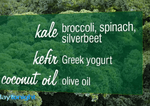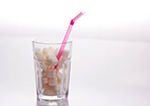Super food or super silly?
by Anne Finch, Accredited Practising Dietitian for LiveLighter
- August 7, 2015
- Leave a comment

We hear about them a lot in the media and see them in the supermarket and at cafes. So what exactly are superfoods? Well, there’s no real definition of what makes a food “super”. There’s a vague kind of idea that they’re “good for you”, or will make you healthier than “normal” food. It’s really just a marketing term, and I can’t help but roll me eyes when I hear it. This is why.
Nutritionism is so last week
Foods that have the “superfood” label on them are often promoted because they have a lot of a specific vitamin or antioxidant. But what about all the other nutrients we need?
Nutrition professionals are drifting away from nutritionism, a nutrient based approach, and focussing more on whole food groups and patterns of eating. That’s where there is good quality evidence about the things we eat and health outcomes. Get the foods right, and nutrients will take care of themselves.
They make expensive wee
Just because some is good, doesn’t mean that more is better. In fact, in some cases more can actually be harmful. Our body can only process so much at one time! Although we can store some vitamins and minerals, many superfoods and supplements provide way more than we need or can use at one time.
Goji berries and acai berries spring to mind here. They are marketed as very high in vitamin C. We can get all the vitamin C we need in a day from one orange, or half a cup of capsicum. We can only absorb so much vitamin C in one go, and we just wee out the rest!
It’s only food!
Superfoods are marketed. Hard. They give us the idea that we need these special, often expensive and imported foods to be healthy. It’s adding to the myth that it costs a lot of money to eat healthy. For the majority of Australians, eating more vegetables and less meat would lead to a healthier diet, savings at the checkout and a smaller environmental impact. It’s a win, win, win!
Junk science
The superclaims are not usually backed by strong science. Many foods have been studied for their health effects and then reported in the media with flashy headlines. These studies are commonly:
- Done in petri dishes or animals, not humans
- Use huge, unrealistic amounts of a particular food or specific nutrient in food
- Are done on a small number of people, or for a short amount of time
But seriously, superfoods do exist
We need to eat superfoods every day, and at every meal. But… we need to expand the definition of superfoods. When you think of superfoods, think of all wholefoods! Fruit, vegetables, lean meats, dairy and wholegrain cereal products are affordable and readily available. Eat a wide variety of these, and you’ll get all the goodness you need.








